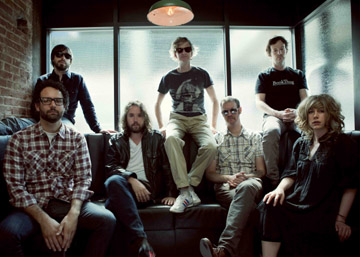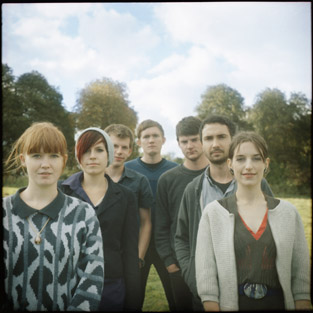Label from the North Country: Arts & Crafts

Broken Social Scene photo by Danielle St. Laurent
Toronto seems like as much of a thriving metropolis as Canada could possibly hope to produce. It’s home to a relevant international film festival, a bevy of skyscrapers and – if you count its outlying suburbs – nearly a quarter of its country’s residents.
Had you found yourself in the city’s music scene in the early 2000s, though, it would seem so much smaller that it was nearly incestuous – a tight-knit community tied together by backyard barbeques, drunken house parties and a downtown core of venues supportive of anything-goes eclecticism. Shows are free-form messes that veer from post-rock instrumentals to zany pop songs, and multi-membership between bands is so hard to keep track of, you’d need a flow chart.
Fun, sure. But it doesn’t exactly sound like the start of what’s become perhaps one of the most pervasive, influential scenes in indie rock, with the lush landscapes of Stars, the intimate vocals of crooner Leslie Feist, and, most important, the accordion-like broadness of Broken Social Scene – all ending up as major-headliner performers on one label. Arts & Crafts is now generally heralded – along with Merge and Saddle Creek – as one of the best small labels in rock music. (There are other “indies” like Matador and Sub Pop that are either part of a label group or owned by a major.)
Well, maybe it’s not so small anymore. With more than 20 employees doing everything from managing bands to working on licensing to booking their artists at festivals ranging from Bonnaroo to Lollapalooza, Arts & Crafts has become a mini-empire. But still, just about everything can be traced back to those early days in Toronto, and to the three guys who started it all: Broken Social Scene founders Kevin Drew and Brendan Canning and label guy Jeffery Remedios, who may have had an inkling, even early on, that their entrepreneurship would take them places. After all, Remedios and Canning first came from the majors – before starting the label with Drew, Remedios was an exec at Virgin Records where “they were grooming me to run the company,” he says. “I felt like there are some amazing people there, but I might get laid off, or I might run this place and lay off my friends.” Canning, meanwhile, had experience in destined-for failure major-label bands – remember Len’s ‘90s-era hit “Steal My Sunshine?” That’s him speaking throughout it. And though Drew certainly found his way into the label game with the most street-cred, he admits to taking music business university crash courses before making music his career – and long before that career threatened to tear apart his closest friendships.
While Arts & Crafts and Broken Social Scene are definitely a family, it’s now a fractured one, with all of its prodigal sons and daughters out on the road in their various solo projects more than ever before. But for two very proud parents (and one… uncle?) its also a community that they built – and one they can’t leave behind, no matter how much they may sometimes want to.
“I don’t care about our public lives anymore,” says 34-year-old label co-owner/band leader Kevin Drew, so matter-of-factly that it almost seems insensitive.
It is definitely shocking that he’s that abrupt, since Drew is both a people person and a talker – which should come as a bit of a surprise to longtime Broken Social Scene fans. Though he’s ostensibly the mouthpiece for a successful, decade-old touring rock band, he’s always been willing to give that position up onstage to whoever wanted it, on whatever song they happened to bring in.
But in Boston, the day before the band plays one of their biggest U.S. headlining shows to date for over 6,000 people in New York’s Central Park, Drew’s open to chatting about all parts of his musical family. “What matters to me most is that we’re still seeing each other,” he says of his labelmates and friends, which is a testament to the fact that, though their relationships may have seemed to have gone through some heat in public, in private, that community he helped foster at least is still relevant to him. As for what he’s lost by being both a label head and frontman, he admits, “It is difficult to wear both hats at times. The only way you can really do it is if you’re constantly on your game.” He pauses. “There were a couple years where I was off my game.”
Still, Drew’s spent over a decade helping raise that musical family, long before Broken Social Scene’s erratic, irritating and near-genius first album, 2002’s You Forgot It in People became a Pitchfork sensation. (The indie bible gave it a rarified 9.2 rating, calling it “endlessly replayable, perfect pop” in a review that catapulted the band, its label, and that website to mainstream prominence.) The album’s almost like a Various Artists package rather than the debut of a new band with Canning, Drew, and a few of their friends as a house band, members alternate song to song – Metric’s Emily Haines sings one, scenester Jessica Moss plays violin on one, Stars’ Evan Cranely lends a bit of trombone, resulting in a record both exceedingly eclectic and unrelentingly re-listenable. But for Drew, that was the moment that his musical musings went from being totally loosey-goosey to a professional career being totally loosey-goosey.

Feist
Though You Forgot It in People was Arts & Crafts’ first release, the real story of the label – and of Broken Social Scene – starts long before that, with a circle of friendship and relationships that’s so he-said/she-said that its intricacies can be hard for even the primary characters to figure out. This much is fact: Remedios and Canning knew each other from their major-label days and at some point, Canning met Drew through music-scene events. Then they started playing together, recording weird-o four track instrumentals while working odd-jobs for cash – PAing video shoots, DJing small club nights – really doing whatever they could to pay their bills. At some point, they all moved in to the same apartment complex in the middle of the Toronto. Music writer Stuart Berman, also the author of the band’s definitive biography, This Book Is Broken, happened to be living in the same sometimes-they-come, sometimes-they-go apartment building as Drew, Canning and Jeffrey. “Brendan would come over to our apartment for dinner and then go downstairs and hang with his new friend, Kevin,” Berman remembers, of the building that, at some point, once also housed Remedios. “It was a basement apartment. So, yeah, that was literally the ground level.”
Canning and Drew became inseparable, then notorious, then kind of ridiculous. They put out a lo-fi noise record under the name John Tesh Jr. They’d play shows with all-new material, then throw it out – an hour’s worth – and play the next show as a totally different band, with completely different songs. They put out the first Broken Social Scene record, Feel Good Lost, on the non-entity label Noise Factory Records, and then would eschew its post-rock feel when they got onstage. “What they were performing had nothing to do with the record,” says Berman, the writer, who remembers some shows as dubby drones, while others veered into psychedelic space rock. Trademark movie theater-sized screens that they used to show showing all sorts of surreal projections definitely helped.
“Instead of recreating this ambient, middle-of-the-night record they made, they’d contact all these friends of their that were around and see if they wanted to play with them,” remembers Remedios.
Berman agrees: “It just naturally turned into this jam session.”
That’s when the tables turned. “These shows started to get quite legendary,” Remedios says. “Feist was there. The Metric folks. Stars. But before those projects – similar projects had started, but hadn’t reached full maturity. [Seminal Toronto band/Broken Social Scene collaborator] Do Make Say Think was a relatively strong going concern, but was sort of doing its own thing.”
But something this energetic can only stay controlled for so long. “Everyone was so into this,” Remedios says, “they tried to bottle it.”
The band entered the studio with then-unknown producer David Newfield. When they were close to finished, they turned to their music-biz insider friend for his take on what would become You Forgot It in People. “I was just floored,” Remedios says now from Arts & Craft’s Toronto headquarters. “I was like, ‘I’m totally in. I’m not a hundred percent sure what that means yet – but I’d love to be a part of it.’”
Remedios quit his job and moved into an office in the same building, donated by his former employers at Virgin as a sign of goodwill. He spoke to Drew and Canning, and only Drew seemed interested in being a business partner. They decided to release not just the Broken Social Scene record, but albums from friends Jason Collett and Apostle of Hustle, mostly because some were members of Broken Social Scene, and they didn’t want to lose them to another label.
Arts & Crafts was born.

Los Campesinos!
Kevin Drew’s business sense started in his immediate familial spectrum. “My dad was in the book business for 30 years,” he says, 10 years after Broken Social Scene’s auspicious breakthrough. “He was a distributor in Canada and he gave a lot of speeches when he drove us to school.” He laughs, then pauses: “It was kind of like business-101/life-101.”
That said, he’ll readily admit that the label was founded – and continues – on two seemingly disparate principals. One side wants to put out records that focus on the artists making art for their own sake while the other wants to see those artists hit the highest commercial peaks possible. From the beginning, there was a definitive decision to not operate like a boutique Canadian label – and, instead, focus on breaking through in the United States. “I’d heard that there’s something like 30 or 40 million people within a 10-hour drive of Toronto,” explains Remedios of the strategy to win over the entire Northeast – not the words you’d expect from a man who thinks in small, lets-do-this-locally terms.
That discrepancy between art and commerce means celebrating when an artist like Feist or Chilly Gonzales lands a lucrative iPhone or iPad commercial (remember “1…2…3…4?” ) and being equally happy when an artist like the avant-musician Charles Spearin delivers The Happiness Project, a charmingly artistic oddity based entirely on the timbres of the human voice. “That was what I loved about it [from the beginning],” Drew says, “that we could have those two sides to it.”
Their smaller artists seem to agree. When they signed to the label a few years ago, U.K. indie rockers Los Campesinos! was one of the few non-Broken Social Scene-related bands on Arts & Crafts and was its first international acquisition. “We don’t like having people or record labels poking us in any direction or suggesting what we should do, and Arts & Crafts had been really happy for us to just call the shots,” says frontman Gareth Campesinos, while taking a break from helping his girlfriend with her taxes at home in London. Still, Arts & Crafts offered some impressive perks. “When we first visited them, their office was so flash,” he exclaims. “There was a Nintendo Wii in the office!”
For Drew, though, it’s another type of balance that’s been the biggest challenge: how to prioritize decisions that are best for the label, while also managing – and fronting – that same label’s biggest band. It takes its toll not just on him, but on his bandmates as well. “We’ve had a lot of trials and tribulations over the years,” admits Canning, when asked about how Drew balances his band-guy and label-guy personae. “It’s a lot of crossed wires, a lot of who’s wearing what hat and are you really wearing that hat or are you wearing this hat?” Still, he says things mostly work themselves out. “With business, there’s always going to be these shortcomings in some way – because the music business is such a funny one.”
For Drew, the moment of reckoning came a couple of years ago when theoretical next-big-things Stars were planning their album release and Drew scheduled his solo album’s drop just a week later. “The gray areas started getting more gray, and I was trying to figure out what to do,” he says. “It was a real bonehead move on my part because I wasn’t really acting as a label head at that point, I was acting as an artist. I remember that was a real awakening experience for me. It wasn’t as if it were in bad taste, it just wasn’t appropriate thinking.” Not long after, Stars – some of Drew’s longest-running friends – left the label. “I kind of turned to Jeffrey [Remedios] and said, ‘Well, this is the end of an era’,” says Drew wistfully.
Helping Drew fix the situation, was his book-loving father, who had previously come on board to help him run the business. “I said, ‘Pops, I’m gonna need some serious help here, because I’m wearing two hats and I’m responsible for a lot of things here.’” Not surprisingly, his dad was a bit taken aback. “‘I never thought it could be as ridiculous as the book business,’ he said, ‘but the music business is just as crazy!’”
Ironically, Drew’s hesitant to talk about what family role he plays when it comes to the inner workings of the label. Press him a bit, though, and he’ll let you in on his secret. “There’s a joke that I’m the Uncle Buck of the office,” he says. “I’m never there, and when I am, I just sit down and chat with people here and there.”
Sometimes – at least in Toronto – family turns out to be all it takes.




















